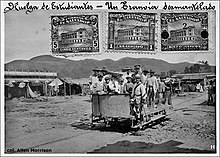Alfredo espino
Edgardo Alfredo Espino Najarro (Ahuachapán, January 8, 1900-San Salvador, May 24, 1928), known as Alfredo Espino, was a Salvadoran poet.

Biography
Edgardo Alfredo Espino Najarro was born in the Department of Ahuachapán, western El Salvador, on January 8, 1900. He was the second of eight children of the educator Enriqueta Najarro and Alfonso Espino, both teachers and poets, he grew up in a home that breathed poetry and love of art. His most important works were: 1-The nest, 2-Ascension, 3-A ranch and a star, 4-Tree of fire, 5-The eyes of the oxen.
In 1920 he entered the University of El Salvador, enrolling in the Faculty of Jurisprudence. During his time at Ciudad Universitaria, he was part of many activities within it, including demonstrations made by students to prevent the rise of tram fares.
In addition, Alfredo Espino published literary collaborations in the magazines Lumen, Opinión estudiante and in the newspapers La Prensa and Diario de El Salvador.
The last years of his life became very adverse; His parents' refusal to consent to his marriage to certain young women led him to constant emotional and love imbalances.To mitigate them, he indulged in long periods of bohemianism, in bars and brothels in the country's capital.
It was during one of these alcoholic crises that he himself ended his life, in the early morning of May 24, 1928 in the city of San Salvador.
First buried in the capital's General Cemetery —where the style speeches were given by the doctor and writer Julio Enrique Ávila and the then graduates Manuel F. Chavarría and Rafael Vásquez—, a few years ago Espino's remains were transferred to the Crypt of the Poets, in the Jardines del Recuerdo private cemetery, south of the city of San Salvador.
His only book, Jícaras tristes, a compilation of 96 poems —published posthumously with the collaboration of various friends and prefaced with an enlightening text by Alberto Masferrer— is considered a national collection of poems by his contemporaries; his author is one of the most read and commented, but not studied or analyzed in his expression.
It has a delicate poetics; she sought to capture his homeland with a lyrical vision; which he presented in a simple style, easy to grasp, therefore without formal complications; he wrote sonnets, ballads and free verse.
Works
- Espino, Alfredo (2001) [1932, posthumous]. Sad faces (13th edition). San Salvador: UCA Editores. ISBN 8-484-05042-4.
Contenido relacionado
Peter Cerbuna
Angel Crespo
Jacques Chirac
